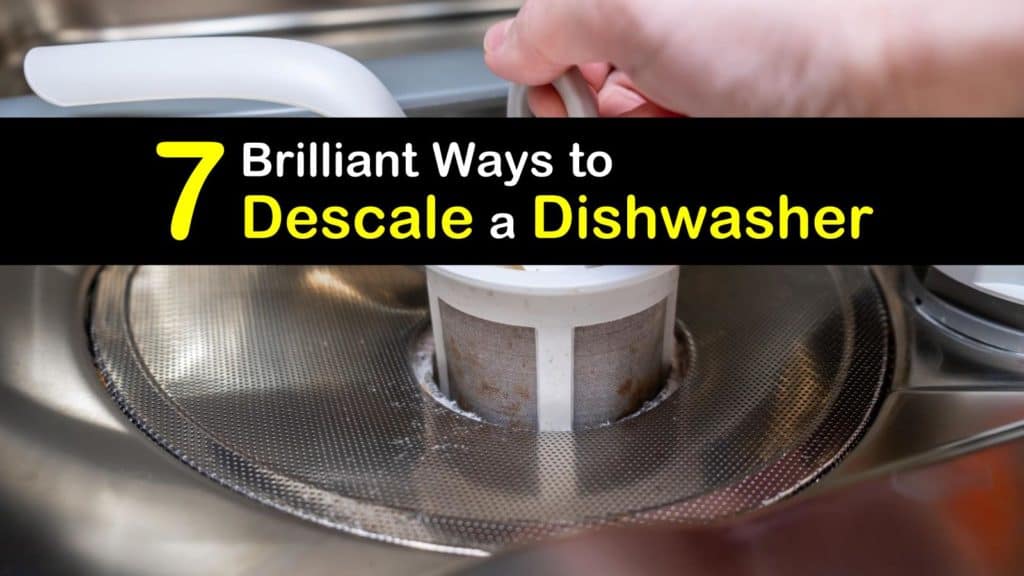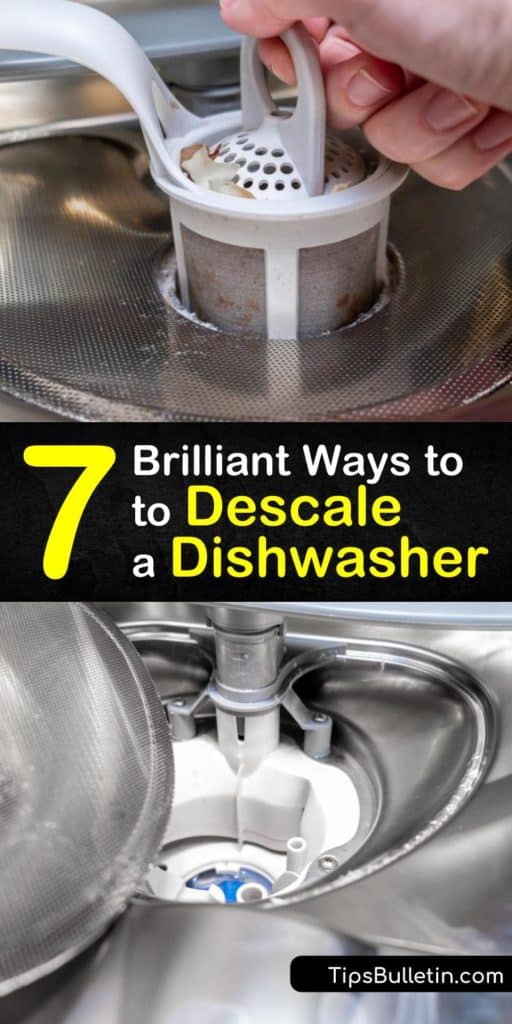How To Clean Hard Water Buildup From Dishwasher
Hard water causes havoc in many household appliances, and the dishwasher is not immune. If you notice white residue or spots on your drinking glasses, then it's probably time to clean the washer. We'll show you how to descale a dishwasher to keep it running efficiently and get your dishes clean.
What is hard water? Water often has high magnesium and calcium levels that are picked up before being treated and sent into your home.
If the mineral deposits are too high, the water leaves a chalky residue and limescale in appliances such as a washing machine or dishwasher. Over time this mineral buildup affects the efficiency of your dishwasher.
The first sign of hard water is noticing that your dishes don't appear to get clean after a wash cycle. They look cloudy and streaked because soap doesn't lather well in hard water.
The second sign is the appearance of a white crust on the spray arms and the bottom of your dishwasher.

- Removing Hard Water Buildup in a Dishwasher
- Clean Calcium Buildup in a Dishwasher with Citric Acid
- Remove Hard Water Buildup in a Dishwasher with White Vinegar
- How to Descale a Dishwasher with Baking Soda
- Removing Hard Water Buildup from a Dishwasher with Borax
- How to Clean the Dishwasher Heating Element
- Using Commercial Products to Prevent Lime Buildup in a Dishwasher
- Ways to Prevent Hard Water Buildup in the Dishwasher
Removing Hard Water Buildup in a Dishwasher
While dishwashers have store-bought, homemade dishwasher soap without Borax or with it running through them regularly, they still require routine cleaning and maintenance, especially if you have hard water.
Here are several ways to descale the washer and remove grime using common household solutions.
Clean Calcium Buildup in a Dishwasher with Citric Acid
What is descaling? This process removes buildup and mineral deposits from hard water, whether it's in your dishwasher, washing machine, or you need to descale your Cuisinart coffee maker.
For a simple and natural solution, try using citric acid to clean calcium buildup in a dishwasher. If you have a stainless steel dishwasher, consider using white vinegar instead.
tb1234
Lemon Juice Dishwasher Cleaning
- 1 cup of lemon juice
- Dishwasher-safe container
tb1234
Pour lemon juice into a dishwasher-safe container and place it on the bottom rack of your washer. Run the machine on a normal cycle to allow the water to fill the container slowly while dispersing the lemon juice's cleaning action throughout the tub.
After the process completes, remove the container and check that the calcium buildup is gone. If it's still present, try using white vinegar instead.
Using lemon juice is the best way to clean a coffee maker without vinegar while still providing excellent results.
Lemon juice or vinegar in the dishwasher rinse cycle will also prevent hard water stains on dishes in the dishwasher. Get your dishes sparkling with this simple additive.
Remove Hard Water Buildup in a Dishwasher with White Vinegar
White vinegar is an acidic liquid with many uses, and it works well to remove hard water buildup in a dishwasher, even if it's stainless steel. It breaks up and dissolves the minerals in the washer during a standard wash cycle. You may find that vinegar is also beneficial to clean out a clogged dishwasher drain hose, too.
tb1234
Vinegar Dishwasher Cleaner
- 1 cup of white vinegar
- Dishwasher safe container
- Toothpick
tb1234
Fill a dishwasher-safe cup or container with white vinegar and set it on the top rack of your dishwasher.
Close the door and use the regular water cycle to disperse the vinegar throughout the inside of the machine. The vinegar breaks up grease and food particles while dissolving hard water deposits.
After the cycle completes, check the inside for any remaining stains, and inspect the spray arms for clogs. Clean the small holes with a toothpick to remove any buildup. Leave the door open after cleaning to air dry.
How to Descale a Dishwasher with Baking Soda
Baking soda is an alkaline, mildly abrasive powder that is a useful descaler and a great way to sanitize a dishwasher. It is ideal for eliminating mold and mildew in dishwasher, too. This ingredient is cheap and probably sitting in your kitchen cupboard.
tb1234
Baking Soda Dishwasher Cleaning
- 1 cup of baking soda
- Hot water
- Spray bottle
- Toothbrush
tb1234
Remove the racks from the dishwasher and set them aside. Fill a bottle with hot water and spray it lightly on the affected area of the washer. Shake some baking soda over the surface and use a toothbrush to scrub the deposits away.
The baking soda scours away hard water stains while eliminating foul odors. Close the dishwasher door and run a normal cycle to flush out the grime and baking soda residue.
Removing Hard Water Buildup from a Dishwasher with Borax
Borax is a versatile cleaner you often see in the laundry room, and it's also a great scouring agent to remove mineral deposits in the dishwasher. Not only is Borax a good cleanser, but it's a dishwasher detergent as well.
tb1234
Borax Dishwasher Cleaner
- 1/2 cup of Borax
- Spray bottle
- Hot water
- Scrub brush
tb1234
Pour hot water into a bottle and spray the inside of the dishwasher to wet it. Sprinkle the Borax into the tub and use a scrubber to clean the surface. Once you're satisfied that the washer is clean, close the door and run a normal cycle to flush away all residue.
How to Clean the Dishwasher Heating Element
The dishwasher's heating element needs periodic cleaning to ensure that the washer runs appropriately. Lemon juice is a safe and mild cleaner that works wonders to clean the element to remove dishwasher limescale and hard water deposits.
tb1234
Heating Element Cleaning
- Lemon juice
- Small container
- Toothbrush
tb1234
Begin by removing both racks from the dishwasher and setting them aside to access the element. The heating element is situated at the bottom middle of the tub, is gray, and generally has a horseshoe shape.
Pour lemon juice into a small container and dip the head of an old toothbrush into the liquid. Brush the entire surface of the heating element gently to remove dried gunk and deposits.
Continue wetting the brush with lemon juice as needed until the element is clean. Replace the racks, close the dishwasher door, and run a normal wash cycle to rinse away residue.
Using Commercial Products to Prevent Lime Buildup in a Dishwasher
If you don't have the time to use a homemade dishwasher descaler, there are many cleaning products on the market for removing hard water stains and descaling a dishwasher.
Dishwasher Commercial Cleaner
There are several ways to descale your dishwashing machine, depending on the product you choose. Some cleaners come in tablet form and are easy to place in the detergent tray or the tub, while others are liquid and are set upside down in the silverware tray.
Follow the directions for your cleaning product and use the recommended wash cycle to release the cleaner. Most products recommend using the hottest, longest cycle, with routine cleaning once a month.
Ways to Prevent Hard Water Buildup in the Dishwasher
Prevention is key when you're dealing with hard water in your home. Here are some ways to maintain your dishwasher and prevent further hard water stains after using a home remedy to clean dishwasher.
Dishwasher Hard Water Prevention
Consider adding a water softener unit to lower the calcium and magnesium levels in your water to prevent the buildup of limescale and mineral deposits in your pipes and appliances.
If you cannot install a softener, try using extra detergent when cleaning your dishes, and use a rinse aid to help eliminate spots and streaks.
Check your dishwasher's instruction manual for recommended amounts and suggestions. Run your dishwasher once a month or more with a cup of white vinegar to keep hard water stains in check.
A dishwasher is a handy appliance in your home, but it does have its issues. The buildup of mineral deposits, food debris, and gunk leads to clogs, causing it to work poorly or not at all. Using the right cleaners regularly keeps this kitchen helper happy and cleans your dishes to perfection.

Now that you know how to descale a dishwasher so that your dishes are shiny and clean, why not share our dishwasher descaling tips with your friends and family on Facebook and Pinterest?
How To Clean Hard Water Buildup From Dishwasher
Source: https://www.tipsbulletin.com/how-to-descale-a-dishwasher/
Posted by: shannontherfull00.blogspot.com

0 Response to "How To Clean Hard Water Buildup From Dishwasher"
Post a Comment